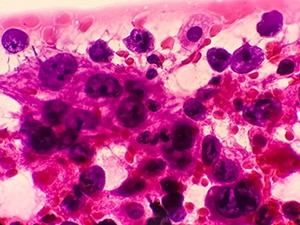EGFR Inhibitor Plus Chemotherapy Approved for Certain Lung Cancers
The FDA has approved osimertinib plus chemotherapy for non-small cell lung cancer with EGFR mutations.
The U.S. Food and Drug Administration (FDA) has approved osimertinib (Tagrisso) plus platinum-based chemotherapy for the treatment of patients with locally advanced or metastatic non-small cell lung cancer (NSCLC) that harbors an L858R mutation or an exon 19 deletion in the epidermal growth factor receptor (EGFR) gene.
Osimertinib is a drug called a tyrosine kinase inhibitor, and it blocks the activity of the tyrosine kinase EGFR. Certain mutations in EGFR—including the L858R mutation or the deletion of a portion of the gene called exon 19—make EGFR overactive, which can stimulate tumor growth.

Osimertinib was previously approved as a single-agent therapy, both in the first line of treatment for metastatic tumors (2018) and after surgery for resectable tumors (2020), for patients with EGFR-mutated NSCLC. The current approval adds platinum-based chemotherapy to these suggested treatment regimens.
The approval was based on results from the open-label, randomized, phase III FLAURA2 clinical trial, which recruited 557 patients with locally advanced or metastatic NSCLC. All patients had tumors harboring either EGFR L858R mutations or EGFR exon 19 deletions, and none had received prior systemic therapy for advanced disease. Patients were randomly assigned (1:1) to receive osimertinib plus chemotherapy or osimertinib alone.
The median progression-free survival was 25.5 months in the combination therapy arm and 16.7 months in the osimertinib monotherapy arm; this equated to a 38% decrease in the risk of progression or death with osimertinib plus chemotherapy compared with osimertinib alone. Overall survival was immature at the time of analysis.
Osimertinib is given orally with a recommended dose of 80 mg once daily until disease progression or unacceptable toxicity.
NSCLC is the most common form of lung cancer, accounting for over 80% of lung cancer cases. The incidence of EGFR mutations in NSCLC varies widely based on race, with patients of Asian descent having the highest incidence and patients of European descent having the lowest incidence; nearly half of EGFR mutations in NSCLC are exon 19 deletions and 35% are L858R mutations. According to federal statistics, it was estimated that 238,340 individuals would be diagnosed with lung cancer and 127,070 patients would die of the disease in the United States in 2023.
The FDA rendered its decision on February 16, 2024.
